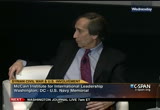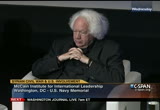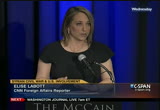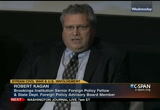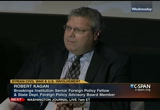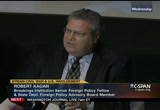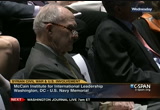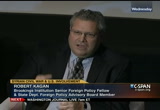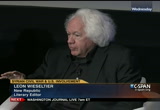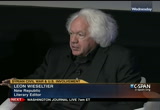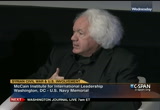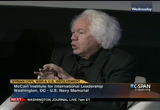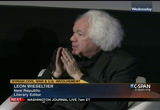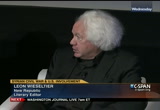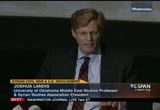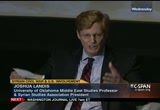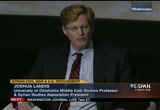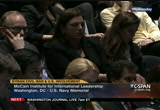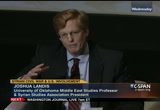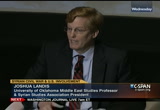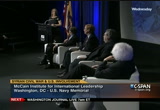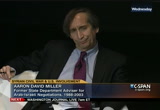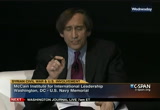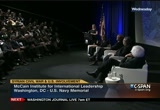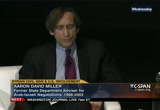tv Syrian Civil War CSPAN February 3, 2013 5:35am-6:00am EST
5:35 am
. his upcoming book is entitled " can america have another great president?" aaron has served callus secretary of state's in the middle east, negotiating middle east peace that we will get to hopefully in another debate. he is also one of the most thoughtful writers out there today. riding daily on these foreign policy issues. leon is literary editor since 1983 and the author of nuclear war, nuclear peace against identity. i might mention that tonight is the relaunch of the new republic. it is really a new era and everyone is excited about that. we will be leaving to go to the new republic party.
5:36 am
this is how it is going to go. we will start with 10 minutes from each team. leon will talk about why the u.s. should do more in the syria. that we will hear from josh and aaron on why the u.s. should not go any further. then the leon and bob will rebut their argument. i will begin a discussion by grilling the one or both of the teams on their arguments. the other side will have a chance to respond. each team will have three minutes to answer questions. their answers strike -- somebody could come and uniform
5:37 am
and escort you out. let's get to it with bob k. again and leon on why the u.s. should be doing more in syria. >> thank you. thank you senator john mccain who is a national hero for the work he has been doing in the senate all of these years. i just use up some of my time, but it is worth it. let me stipulate first of all, the united states cannot do everything everywhere. we cannot involve ourselves even when there are humanitarian crises. we cannot always involve ourselves. there are limitations on our capabilities, our resources, and our attention. the question really is, does syria rise to the level that those acquire our attention. if you think about america's
5:38 am
role in the world, traditionally a our involvement, we easily become involved not necessarily just for humanitarian reasons. sometimes for strategic reasons. very frequently when humanitarian issues and strategic issues -- strategic interests converge. syria is unquestionably a place where humanitarian issues do converge. lisa has talked about it. senator mccain has talked about it. you read about it every day. it is a horrendous humanitarian catastrophe. the only thing i would add is the upward of 1 million displaced people inside syria today who are about to enter a winter. and are living in tents and may
5:39 am
suffer catastrophic consequences of something is not done. we are supposed to be pivoting away from the middle east, the middle east remains a cockpit of difficulty in the world and a vital strategic interest for the united states and our allies. the consequence to us directly of assyria becoming a failed state with chaos i think is more we should be willing to tolerate. one thing we have learned, to so awfully and convenient when many americans would not want to be so involved, we have learned that when chaos and failed states emerge in the world in a time when terrorists are looking for opportunities to base themselves, to find basis from
5:40 am
mercer is said and it states, if we can prevent failed states in a place like syria or there are chemical weapons, we should certainly be doing so. there is the added fat as lisa has pointed out -- the added fat as lisa has pointed out. is involved, israel can become involved. i mentioned we do get above and have gotten involved in these situations. i think is appropriate to think back on one episode that i think is relevant. april 1991, i didn't know if it is in your terrific book but a a a different book. there is an account of the jim bakker visiting the kurdish region of iraq and watching tens of thousands of refugees.
5:41 am
he called back to washington. his voice breaking and said, we must do something. they sent wanted dozen trips. they sent 20,000 troops to somalia to deal with potential humanitarian catastrophe there. and all of the cases, save thousands if not hundreds of thousands of lives. we are proposing not 20,000 troops or 30,000 troops. we are proposing that we provide the aid, the military and humanitarian aid to the opposition needs to turn the tide right now. if necessary to provide a
5:42 am
northern -- a no-fly zone i can be done with better already in place and turkey. given the stakes and turkey, it is not too high of a price for the united states to play. >> i will open it up just a little bit because the debate about syria is not just a debate about syria. is also a debate about american foreign policy, generally. everything that obama said would happen if we intervened in syria happen and we did not intervene and that what are you empresses we did not intervene. there is no longer a foreign policy consensus in the republican party, and they are returning the united states to a strategic -- america -- it is a
5:43 am
concept that is small, narrow, nativist, self regarding, and involved, and on international list, and even anti internationalist. barry's president from other parties of honored, not just as an internationalist enterprise but a transformational country for the entire world. one of the reasons you cannot talk about syria or interventionism or isolationism or any words used these days without bumping up against the guy we cannot afford to do it. the first thing i want to say is the correlation that people
5:44 am
make both economists make between our strategic position in the world is not remit -- remotely as neat as they think it is. the evidence of this is everywhere. every time the people of iran take to the streets or in the libya or in tahrir square or when there is an earthquake in haiti or a reactor in japan now, they did not look to brazil or india. a look to the united states. the economic crisis we are undergoing should in no way inhibit us from proceeding with a strategic debate that we have to have. history does not allow us either zero sums or time outs. it is never a zero sum between domestic and foreign policy. we always have to proceed within our borders and outside.
5:45 am
there are no zero sums or time aus for the united states when we can call a timeout and tell the world to pause while we get our economic situation back in order. the sooner we understand that what we are debating is a moral, historical, and strategic question and not an economic or budgetary question, the budget can be cut 100 different ways and the defense budget can become 100 different ways, or not at all. this whole element of the conversation has to be retired. there are crises that involve our values but not our
5:46 am
interests. there are crises that of all our interest and on our bellies. there are crises that of all of both. obviously, the ones they're involved our interests are the easy ones. there are some challenges that to not seem to involve our interests very much, but we do bring our values and to a question. the classic example would be rwanda. circassia given the magnitude of the humanitarian crisis there -- syria, given the magnitude of the humanitarian crisis there, there is no greater blow that could be dealt to iran than the fall of the assad regime. if one wants to be a cold hearted realist and criticize all the public and moral
5:47 am
considerations that people like me like to develop, there is no question that from a cold strategic standpoint, our interest requires us to do what ever we can. what i said what ever we can -- here i go back to something kagan said, nobody is talking about 200,000 troops. the iraq war is not all we need to know about every foreign policy decision that the united states never has to make. i would say that the final. we will discover, and we have discovered before, the pursuit of our moral values abroad turns up to the strategic benefits to the united states. the strongest position in the world the united states can have is when it has alliances not with regimes but with people. it is the point of the event. [applause]
5:48 am
>> if you are twisting out there,-- tweeting out there, but this know your thinking about the debate this evening. would you like to take up why the u.s. is doing enough in syria? >> i do not want to argue that the united states is doing enough. i do not think it is doing enough. and one to argue not getting into the middle of an ethnic war. obama announced he will spend an extra $165 million on syria appear that makes us the biggest donor at about one-third of $1 billion. that is not enough. the humanitarian situation needs a lot more money. the syrian opposition has asked for $62 billion. i do not know where it will end up.
5:49 am
the question here tonight is can america saved syria. only the syrians can save as syria. america cannot nation build in the middle east and should i get into the middle of a sectarian and ethnic war appeared to have tried to do that twice and it has ended in tears. has spent over $1 trillion in iraq and afghanistan. we tried to pick winners. we have not been happy with them. we didn't know how to do it. in iraq we tried to cast down the sunis and threw them to the bottom of the society and raised up the shiites. today we have another tyrannical rule forming. very unhappy.e
5:50 am
it is long and bloody. 10 years since we invaded. they have become radicalized that are blowing up car bombs every day because it is a zero sum game for the losing ethnic groups. we entered into love and on and 1982 to try to put the christians on top of the muslims. -- lebanon to try to put the christians on top of the muslims. today we are trying to manage syria ethnically and put the suni's on top of the alawites. most of the minorities are clinging to the alawites. what will syria look like tomorrow? none of us know. we do not know if it will break up into three countries, and alawite enclave on the coast and
5:51 am
the suni's in the middle. if we decapitate the assad regime and the suni's takeover, the alawites, 2.5 million of them, could run for their lives. it could be ethnic cleansing. it could all go to lebanon. it is one hour away. like the palestinians running in 1948. we do not know what we are unleashing in syria. a new ethnic balance is being worked out in the entire lebanon, iraq, palestine-is
5:52 am
real. it is going to happen in the syria. there is a major sorting out going on with ethnic groups moving around, some leaving, some staying. if america thinks we can get into the middle of this, we better be prepared to spend billions of dollars. if there is ethnic cleansing, we need to be there to help people. i do not think that america can decided this equilibrium. if we push our hand too far on one side of the scale and then we leave as we invariably do -- as we did in the iraq as we try to power up and give the suni's part of the ethnic sharing deal. as soon as we did it, ran for the exodus. then we don't the suni's.
5:53 am
they were expelled and that is why they are on the warpath again. we abandon them. we will do this something to syria. it will be very bloody. america should be there to pick up and help encourage and save as many people as we can. at the university of oklahoma, this president boren has accepted scholarships for circassians. it is difficult to sell the humanitarian problem. -- syrians. to think that we can save as syria is a fool's errand. it would have ended up with chaos and both situations. syria will be long and tough. we cannot on radicalize syria. the argument that if we had gone and first, it would not have become radical is a false
5:54 am
argument. we went into iraq and within three months we've decapitated the regime. within months al qaeda spread throughout. radicalism has spread among the palestinians because they have been cast down and they are losers. america spent over hundreds of millions of dollars trying to solve the conflict. we are not good at this. america should not launch into trying to solve and save the serious problem. [applause] >> aaron is the senate of the group. -- cynic of the group.
5:55 am
>> i an not for doing nothing, and i in not cynical. we may not agree on this, but i respect your clarity and honesty, which are two things missing in diplomacy and a life in general. i will make three of four points. my argument is emotionally unsatisfying and negative. i spent 25 years at the state department working for democrat and republican senators of state. i had a certain number of illusions during that period. but i cannot continue now that i am out of government service to harbor illusions. it is unfashionable to talk about the disease without discussing the remedy. we must discuss about the nature of the problem so that we do not rush forward without thinking
5:56 am
through the relationship between ends and means so we have a chance to remedy the problem. it is not a chance of -- it is not a question of saving syria. even if we could, we should not. the resources we would need to put into this enterprise would far exceed our capacity to actually succeed. nobody is talking about boats on the ground. iraq and afghanistan as parallel for two reasons. began to think about the relationship between the means at our disposal and the capacity to achieve our aunts and how the application of those means is likely to affect the and the game. the end state and syria is far
5:57 am
from clear. we do not understand and know -- josh will forget more about syria than anyone among the four of us will ever know. this is an important point. the best analysis leads to the best policy. i do not believe this should constitute the broader issue of what is wrong with american foreign policy. that is not a fair test. the reality is, those who oppose a proactive role in syria, i do not abandon american leadership. i a not a declineist. i think america is an exceptional country. the dividing line, not between democrats and republicans, left
5:58 am
and right, but between dumb and smart on the other hand. which side of the line does america want to be on? i would argue more consensus today than at any point and i can remember. that is one of the reasons the party had such a hard time finding a vulnerability that resonated with the general public in the debates and in the campaign. barack obama is two things. he is a republican realist. he is less reckless, more disciplined a version of george w. bush. he has monopolized the territory of the republican party's foreign policy, which is one of the reasons chuck hagel has proven to be contentious. it is about republicans struggling with the fact they
5:59 am
need to somehow reset. so much blood has flown -- floated is impossible to a imagine a transition now -- i say this not to trivialize -- not enough has flowed to force a divided self-centered community to emerge with a unified policy. this is not barack obama's. i voted for republicans and democrats. i worked for republicans and democrats. i have serious problems with some of his foreign policy. the notion he is responsible for this or an earlier intervention would have prevented the radicalization. decentralization is the subtext of the arabs bring the, arab of the arabs bring the, arab
183 Views
IN COLLECTIONS
CSPAN Television Archive
Television Archive  Television Archive News Search Service
Television Archive News Search Service 
Uploaded by TV Archive on

 Live Music Archive
Live Music Archive Librivox Free Audio
Librivox Free Audio Metropolitan Museum
Metropolitan Museum Cleveland Museum of Art
Cleveland Museum of Art Internet Arcade
Internet Arcade Console Living Room
Console Living Room Books to Borrow
Books to Borrow Open Library
Open Library TV News
TV News Understanding 9/11
Understanding 9/11